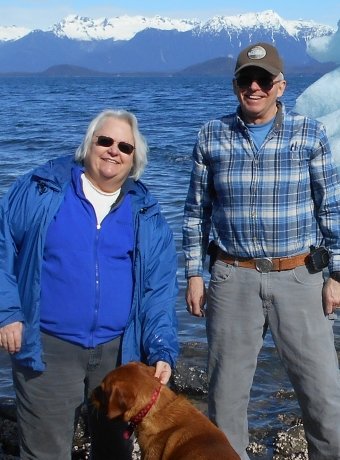Rich and Sue Jennings

- BS Forestry 1977
- BS Fisheries Biology 1977
Rich Jennings was raised in southeast Michigan and served in the US Air Force during the Vietnam War doing electronic warfare systems research in New Mexico. In his off-duty hours, Rich volunteered as a leader for a troop of Explorer Scouts, and discovered his love of working in the woods. Following his service, he enrolled at Michigan Tech and studied forest management. He met Sue in what to some would seem the most unlikely of places, but to a forestry major, was the most natural of locations: Isle Royale.
“I was working for the summer season on Isle Royale, just after I got out of the military and had finished a year of school. Sue was in the second year of fisheries biology,” Rich says. “I was seasonal to the park service, doing both law enforcement as well as interpretation. She was working at one of the lodges. We’ll have been married 44 years in May.”
That summer on Isle Royale launched careers in the Forest Service for both of the Jennings. Following graduate school at Indiana University, the couple moved west to work on the Salmon-Challis National Forest in central Idaho, and then to southern Idaho to the Sawtooth National Forest. The Jennings moved to Alaska in 1990, figuring they’d spend a few years there before moving back to the Lower 48. That never came to pass.
“Without exaggerating, 25 to 30 percent of the non-Alaska native people here are from the Midwest,” Rich says. “A good number of Tech alumni are in Alaska, mostly as natural resource managers. There’s so much here to do: cross country skiing, fishing, hunting.”
Located until recently in Petersburg, Alaska, Rich worked as a forester before becoming a certified silviculturist, and then finally transitioning into a management role as a ranger on the Tongass. He spent his final six years working as the district ranger in Hoonah, a Tlingit village.
Sue worked as a field-going fisheries biologist, spending a lot of time snorkeling for population estimates and management. Her career turned toward planning, though, and she is currently the forest planner for the Tongass, the largest national forest in the US Forest Service system. In addition to her work on the Tongass, she also recently worked on the forest plan amendment for the Chugach National Forest.
“When we moved to Alaska, we met many people from Michigan Tech working for the Tongass National Forest,” Sue says. “Now there’s only a few. I’d like to see more Michigan Tech alumni working for the Forest Service in Alaska on the Chugach or Tongass. It’s a good fit for skills, experiences, and a rewarding career.”
Sue and Rich have two children, daughter Kolleen, who works for Siemens in Washington, DC, and son Paul, who works for the State of Alaska as an OSHA inspector. The Jennings have four grandchildren.
“We’re home,” Rich says. “The Forest Service is like family. You get to know these people you work with day-in and day-out. It has been a good agency to work for.”
In retirement, Rich is a volunteer DJ at a local radio station, though he has been doing radio work since 1993. His show focuses on rock and roll from the 1960s and 1970s.
“Tech was a great place to go to school. I look back and know I’d do it again,” Rich says. “In my mind, Michigan Tech, not only because of its curriculum, but because of its location, needs to retain a hands-on approach to forestry. It’s vital to gain hands-on experience before graduation by continuing to have outdoor laboratories associated with the courses. Forestry is not sitting behind a desk all day. It’s hands-on, being able to apply research in the woods.”
From the Winter 2020 edition of the Forestry Newsletter.